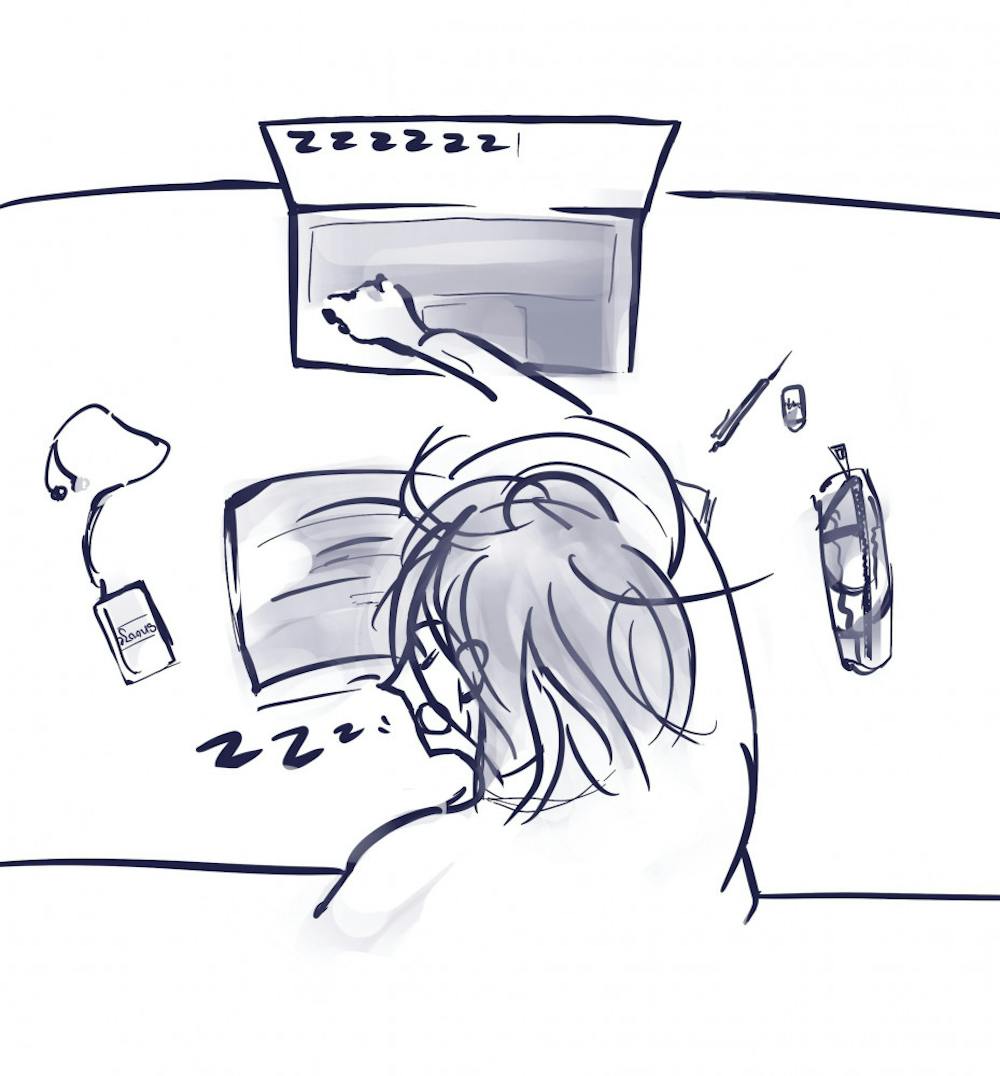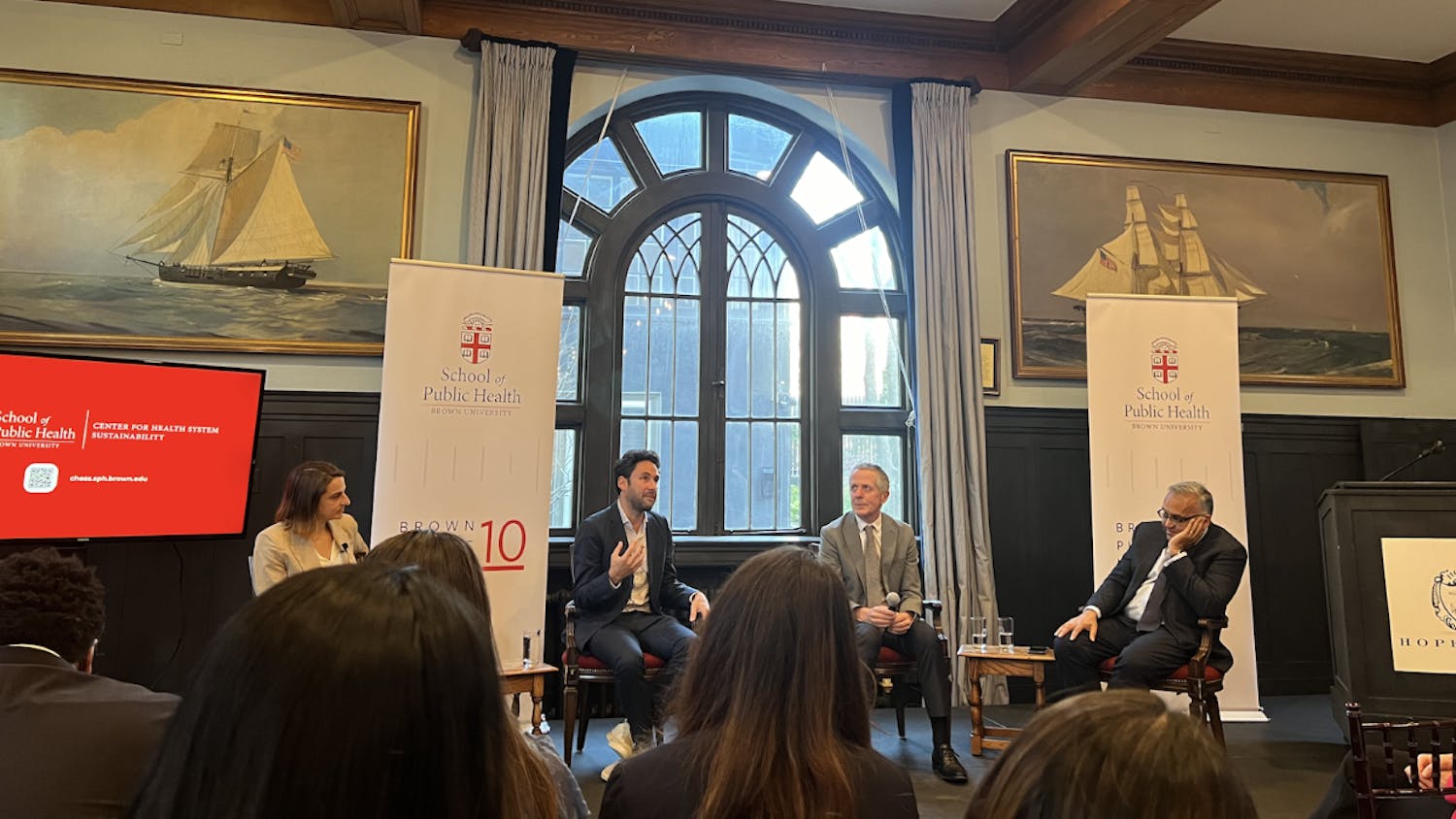Sleep rejuvenates the body and the mind, and drooping eyelids, nodding heads and the temptation to succumb to a nap in lecture point to the potential risks caused by lack of sleep among some at the University.
Nearly a quarter of undergraduate students who participated in The Herald’s spring 2019 poll reported sleeping an average of six or fewer hours each weeknight. Meanwhile, about two-thirds said they sleep between six and eight hours, and only 9.2 percent enjoy eight or more hours of rest each night.
The 24.6 percent of students sleeping under six hours is a concern, said Professor of Psychiatry and Human Behavior Mary A. Carskadon. Less than six hours of sleep has been found to escalate the chance that young people will partake in dangerous and risky behaviors by about three or four times, she said. Although there has not been extensive research done on sleep among young adults, the psychological, cognitive and physiological impacts of losing these hours of rest should not be drastically different compared to adults, she said. A lack of sleep still adversely affects individuals’ diets, hormonal function, immune system response and learning ability. In addition to helping one stay attentive during classes, sleep has been shown to contribute to a person’s ability to consolidate information from the day and retrieve those memories later. Even instrumentalists, for example, can increase their performance level by 10 to 15 percent by practicing their music and then getting a night’s rest.
Sleep deprivation also makes students more irritable and exhausted, said Adam Pallant, clinical director of Health Services at the University. “If I had (a) magic wand, I would have people having regular sleep cycles,” Pallant said. “They would essentially have a rhythm to their day (and) … they would sleep predominantly seven to eight hours a night, and that would include weekends,” Pallant said. But he recognizes that this ideal goal is not feasible for everyone.
In one study, Carskadon tracked first-year students’ sleep over their first nine weeks in college and found that students who slept less had a more depressed mood. Why? Sleep correlated with variations in a gene related to serotonin transport, which is the hormone associated with feelings of happiness. Researchers used this information to examine how sleep affects a person’s genes and found that students who slept regularly and for longer periods of time became “biologically younger,” Carskadon said.
Causes of sleep deprivation at the University range from courseload and concentration to the pressures of social activities and extracurricular work.
Mateo Encarnacion ’21.5 sleeps eight to ten hours a night this year. But during high school and his first year of college, he regularly went to bed after 2 a.m. He credits more sleep this year to a change in his course schedule and an overactive first-year social life. As a first-year, he took multiple computer science courses but this semester only takes one STEM class. He credits some of his change in sleep to that shift. “I definitely do feel like the concentration can affect (sleep),” he added.
The Herald’s poll found that 69 percent of students who sleep less than six hours a night are not humanities concentrators, meaning they study life sciences, physical sciences, social sciences or business.
Karyna Atha ’21 said she averages about six hours of sleep a night. Studying for exams most determines the number of hours she sleeps, but dorm conditions can also have an effect on her quality of sleep. Also, while one night of minimal sleep may not pose a problem the following day, “if I do it for two to three nights consecutively, then I start experiencing the effects,” she added.
Sleeping very little during the week and trying to catch up on the weekend can actually be detrimental to health and not have the desired recovery effects, Carskadon said. “One of the cardinal suggestions is to have a good plan to sleep and not just have it be whatever happens when you run out of energy,” she said.
Further, despite the temptation to snooze for an hour or two in between classes during the day, students should be careful with naps. “I’m not (going to) say napping is bad, but if you’re trying to have the best sleep you can have, you want to get it … at nighttime,” Carskadon said. A nap eight to ten hours before the time when one typically goes to bed may be fine, but, otherwise, it will be much harder to fall asleep at night.
While naps may be a surprising culprit in the world of sleep dangers, caffeine and electronics also remain significant areas of concern. Caffeine — the secret agent that can push one past this time into the late hours — can negatively impact one’s circadian rhythm, Carskadon said. Data taken from across the country has suggested that spending a significant amount of time before bed with electronics in hand can reduce quality and quantity of sleep, Pallant said.
Other common reasons for sleep deprivation among students include a struggle to fall asleep due to the inability to quell one’s thoughts, even when tired, he added.
But as long as bedtime is consistent, sleeping eight hours will likely have the same effect whether one goes to bed at 11 p.m. or 2 a.m., Carskadon said.
The University has taken actions to help students cope with the repercussions of low sleep, Pallant said. Counseling and Psychological Services particularly aids those who are afflicted with persistent thoughts that prevent them from falling asleep, and Health Services provides additional interventions.
BWell has also employed an array of initiatives to educate students about sleep hygiene, Director of BWell Health Promotion Tanya Purdy wrote in an email to The Herald. BWell has created workshops for all University students and used social media and public health campaigns in the form of “sleep sheep” posters as platforms to inform individuals about sleep hygiene. The organization also invites students to participate in a short Sleep Hygiene Assessment every semester to obtain sleep advice personalized to them. BWell is “also intentional about how we discuss sleep in several of our other educational offerings that address stress, self-care and other wellbeing topics so that folks can see the connections and view their wellbeing more holistically,” Purdy wrote.
If these options do not provide sufficient care, Health Services may prescribe medications, but this intervention is only used as a last resort, Pallant said.
Pallant added that he was pleased to see that 66 percent of students get six to eight hours of sleep, according to The Herald poll. “I have no baseline data to compare it to,” he said, “but, honestly, it’s a little better than I might have guessed.”





